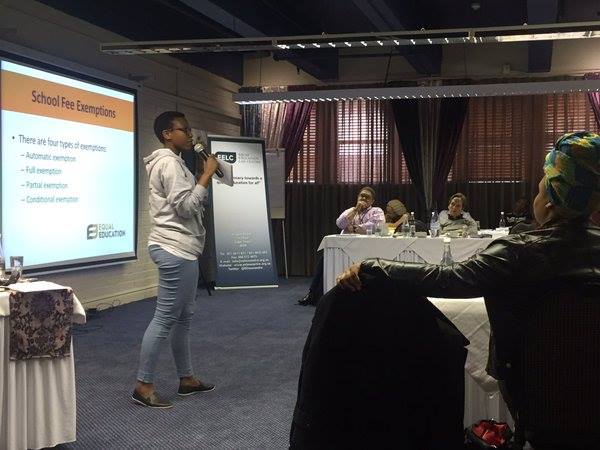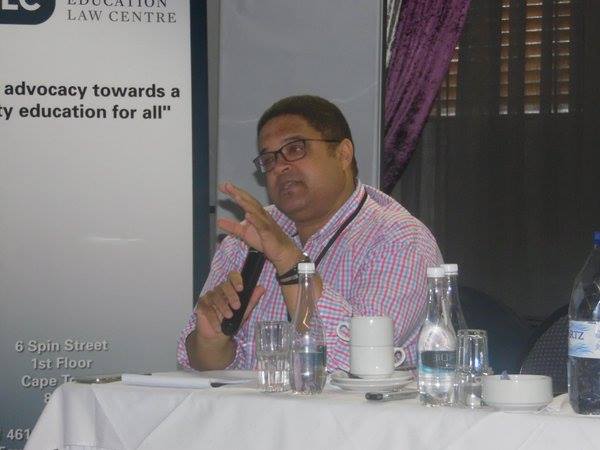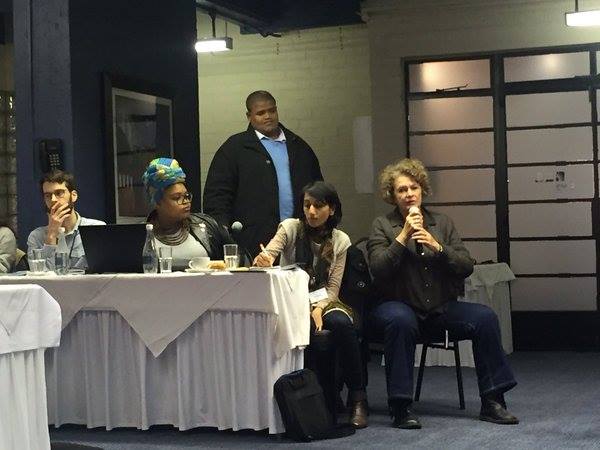On 12th and 13th May, the Bertha Foundation supported a critical gathering of lawyers, education activists and storytellers in Cape Town, South Africa. The 2-day roundtable, convened by Equal Education Law Centre, focused on the critical issue of school funding models and the need to develop a more equitable approach.
 This year marks the 40th anniversary of the historic 1976 student protests in South Africa against the Apartheid education system. This year also marks the 20th anniversary of the adoption of South Africa’s Constitution. The Constitution’s special guarantee that everyone has the unqualified and immediately realisable right to basic education must be celebrated. However, after generations of skewed resource distribution in education – serving only the minority of the country’s interests – the destructive legacy of Apartheid on South Africa’s education system runs deep. As stated by the recently retired Deputy Chief Justice Dikgang Moseneke:
This year marks the 40th anniversary of the historic 1976 student protests in South Africa against the Apartheid education system. This year also marks the 20th anniversary of the adoption of South Africa’s Constitution. The Constitution’s special guarantee that everyone has the unqualified and immediately realisable right to basic education must be celebrated. However, after generations of skewed resource distribution in education – serving only the minority of the country’s interests – the destructive legacy of Apartheid on South Africa’s education system runs deep. As stated by the recently retired Deputy Chief Justice Dikgang Moseneke:
“Apartheid has left us with many scars. The worst of these must be the vast discrepancy in access to public and private resources. The cardinal fault line of our past oppression ran along race, class and gender. It authorised a hierarchy of privilege and disadvantage. Unequal access to opportunity prevailed in every domain … While much remedial work has been done since the advent of constitutional democracy, sadly, deep social disparities and resultant social inequity are still with us.”
Twenty-two years into South Africa’s democracy, poverty and financial barriers to access to education are being placed at the forefront of our political discourse. In October 2015, a wave of student protests shook the country as University students rejected fee increases under the banner of #FeesMustFall. As the demand of free tertiary education gains momentum amongst post-school youth, the issue of resource distribution in basic education has also become a focal point in the national discourse.

The beginning of 2016 has seen a series of protests by parents and learners demanding access to quality schooling, with parents resorting to the closing down of schools until demands for better resource allocation are met. Indeed, Basic Education Minister Angie Motshekga has decried the state of education as being “a Cinderella system deprived of resources and characterised by pockets of disasters . . . this is akin to a national crisis”.
With impending deadlines to fix school infrastructure; successive court judgments requiring government to deliver on school resource needs; the increase in protests for access to education; and a spiralling economic downturn, there was an urgent need for activists, lawyers, storytellers, researchers and policymakers to find spaces to come together for intensive reflection and engagement on key, structural levers of change in the education system.
Through its Impact Opportunity Grant, the Bertha Foundation recently facilitated that platform by supporting an education roundtable on Equitable Funding of Schools in South Africa. The roundtable was hosted over 12 and 13 May 2016 in Cape Town by the Equal Education Law Centre, and brought together a powerful combination of education activists, social justice lawyers, academics, and journalists, as well as treasury and state advisors. Held under the title “Towards Equity”, the roundtable examined prevailing realities of schooling and finances, and explored interventions toward the equitable funding of public schools.

The first afternoon began with a presentation from Daniel McLaren of the Studies in Poverty and Inequality Institute. Focusing on national and provincial trends in education spending, McLaren tracked a concerning downward trend in funding allocations toward education and made a passionate call for civil society to resist this trend.
The International Budget Partnership’s Albert van Zyl followed. Van Zyl examined the lack of public accountability in budgeting and spending on school infrastructure, highlighting the large-scale failure by officials to publish relevant documents and reports. The extent of the crisis in access to information was demonstrated when a government official explained that national departments also have difficulty in obtaining basic information, which frustrates planning for budgets and funding.

Turning to teacher distribution in South Africa, Debra Shepherd (a researcher at the University of Stellenbosch) emphasised the need for evidence-based approaches to models of resource allocation in South Africa. The first day ended with a presentation by Spencer Janari of National Treasury, who provided an insider perspective on the process of developing the education budget at a national level and allocation to provinces. This was a rare opportunity for civil society to engage directly with representatives from government on the issue of school funding and the robust engagement which followed nurtured greater understanding for all gathered.
After the intensive and energised sessions of the first day, several important questions had crystallised in the debates: To what extent is the allocation of money from the national coffers to provincial departments decided on an equitable basis; is it a good idea to address inequity in school funding by additional ring-fencing of funds; and how can top teachers be incentivised to teach in worse performing or poorer schools?

With those questions on the table, day two began with a focus on the policy framework for non-personnel funding in public schools. Professor Rajkumar Mestry and Eddie Rakabe each looked into the flaws in the non-personnel formulation and explored recommendations for a more equitable approach. Andile Cele from Equal Education compared fee charging and no-fee public schools, and raised questions of inequity inherent in the state funding for richer schools, which are able to raise significant funds from middle class and wealthy parents.

With much of the technical aspects of school funding having been carefully explained and hotly debated, the afternoon presentations focused on challenges on the ground. Zukiswa Kota from the Grahamstown based Public Service Accountability Monitor presented on the administrative challenges and bureaucratic instability of the Eastern Cape Department of Education, and Professor Mary Metcalfe looked at the roles of the state and of schools in spending, and often inadequate levels of district training and support. Finally, a closed session of activists and education experts discussed ways forward in intervening towards equity in school funding.
The Bertha Impact Grant allowed lawyers, activists and journalists to engage in reflective, focused and challenging debate amongst ourselves and with policymakers on urgent areas for reform. Going forward, the EELC in collaboration with partners will be using various advocacy tools, as lawyers and activists, to campaign for a more equitable funding system. We invite our friends and partners in the Bertha Network to follow our work and engage us further on the struggle to turn Constitutional promise into lived reality.
 Nurina Ally, Executive Director, Equal Education Law Centre, EELC
Nurina Ally, Executive Director, Equal Education Law Centre, EELC
 Daniel Linde, Deputy Director, Equal Education Law Centre, EELC
Daniel Linde, Deputy Director, Equal Education Law Centre, EELC
Follow EELC on Twitter @EElawcentre
Article Tags: accountability / Bertha Fellows / EELC / Human Rights / human rights lawyers / movement lawyering / South Africa